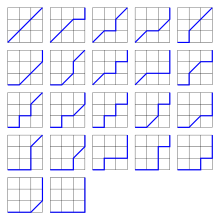I'm trying to create a program that will traverse a randomly generated maze where 1's are open and 0's are walls. starting in the top left and ending in the bottom right. The path can go up, down, left, and right.
Currently, my program gives me a solution, but I'm having trouble getting it to print more than one path.
I've read several different versions of this problem, but I'm unable to find one quite with my parameters.
Here's my code, I omitted the part where I randomly generate my maze.
#include <stdio.h>
#include <stdlib.h>
#include <time.h>
#include <stdbool.h>
int n, minMatrix, solIndex = 1, minLen = 10000000; //I use the latter 3 variables in order to find the shortest path, not relevant for now
bool solveMaze(int mat[n][n],int x, int y, int sol[][n], int count){
int i, j;
if((!(x >= 0 && x <n && y >=0 && y < n)) || mat[x][y] == 0 || sol[x][y] == 1){
return false;
}
if(x == n-1 && y == n-1){
sol[x][y] = 1;
printf("Solution %d is:\n", solIndex);
for(i = 0; i < n; i++)
{
for( j=0;j<n;j++)
{
printf("%d", sol[i][j]);
}
printf("\n");
}
if(count<minLen)
{
minLen = count;
minMatrix = solIndex;
}
solIndex +=1;
sol[x][y] = 0;
return true;
}
sol[x][y] = 1;
if(solveMaze(mat, x+1, y, sol, count+1)){
return true;
}
if(solveMaze(mat, x-1, y, sol, count+1)){
return true;
}
if(solveMaze(mat, x, y+1, sol, count+1)){
return true;
}
if(solveMaze(mat, x, y-1, sol, count+1)){
return true;
}
sol[x][y] = 0;
return false;
}
I've omitted the part of my main where I randomly generate my maze.
int main(){
if(!solveMaze(**mat, 0, 0, sol, 0)){
printf("No possible paths, run program again\n");
}
else{
printf("the shortest path is %d\n", minMatrix);
}
}
For instance if I have the maze
1100111111
1101111111
1111110110
1110011111
1101101011
1111101011
1110111101
1100111111
1110111011
1101101111
It gives me the first path that it finds
1000000000
1001100000
1111110000
1100011000
1100001000
1100001000
1100001000
1100001011
1100001011
1100001111
Though it takes a roundabout way of getting there, due to the preferences of going in order of down, up, right, and left, it is still one path.
So ultimately, I'm not sure how to iterate for multiple paths.

